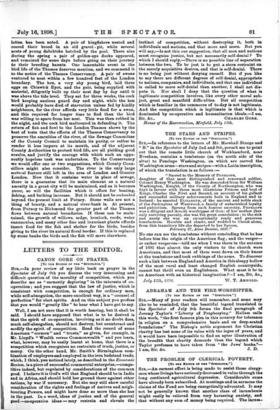LETTERS TO THE EDITOR.
CANON GORE ON PRAYER.
[To THE EDITOR OF THE "SPECTATOR."] Sin,—In your review of my little book on prayer in the Spectator of July 9th you discuss the very interesting and difficult question of the morality of competition, which you describe me as "earnestly deploring" in the interests of co- operation; and you suggest that the law of justice, which is consistent with competition, is enough for ordinary men, arhile self-abnegation, the more excellent way, is a " counsel of perfection" for elect spirits. And on this subject you profess that you would " greatly like " to hear what I have got to say.
Well, I am not sure that it is worth hearing, but it shall be said. I should have supposed that what is to be desired is that the spirit of co-operation, involving as it no doubt does, much self-abnegation, should not destroy, but counteract and modify the spirit of competition. Read the record of some American " corners " and " trusts," as given, for example, in Mr. Lloyd's " Wealth versus Commonwealth " and you learn, what, however, may be easily learnt at home, that there is a competition which recognises no restraints of truth, justice, or mercy. On the other hand, Mr. Smith's Birmingham com- bination of employers and employed in the iron bedstead trade, which, I think, you noticed lately, as described in the Economic Review, is a piece of successful commercial enterprise,—compe- titive indeed, but regulated by considerations of the common good. I believe it is God's will that England should be in India and in Africa, and should hold her ground there against other nations, by war if necessary. But she may still show careful consideration of the rights and feelings of natives and neigh. bouring Powers, and might have done so more than she has in the past. In a word, ideas of justice and of the general good—co-operative ideas — may restrain and elevate the instinct of competition, without destroying it, both in individuals and Rations, and that more and more. But you will say,—Is not this our suggestion, that all men and nations must recognise justice, but not necessarily self-denial ? To which I should reply,—There is no possible line of separation between the two. To be just is to put a stern restraint on the merely acquisitive desires, and that is self-denial. There is no being just without denying oneself. But if you like to say there are different degrees of self-denial, appropriate to nations, companies, and individuals, and that one individual is called to more self-denial than another, I shall not dis- pute it. Nor shall I deny that the question of what is legitimate competition involves, like every other moral sub- ject, great and manifold difficulties. But all competition which is familiar in the commerce of to-day is not legitimate. And the competition which is legitimate is that which is dominated by co-operative and humanitarian ideals.—I am,


































 Previous page
Previous page